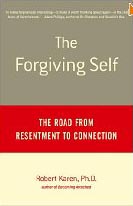 The Forgiving Self
The Forgiving Self
The Road from Resentment to Connection
by Robert Karen, PhD
Doubleday, New York, 2001. 288 pages.
Even quite a few years into the divorce process myself, I still feel that anyone going through a divorce can benefit from thinking about forgiveness, if only for your own sanity!
I’ve read quite a few books on forgiveness. This one by Robert Karen took a more academic approach, a psychological approach, to the subject. I especially liked the way he explored many different aspects of forgiveness, including our natural tendency not to forgive.
I read the book slowly, and it gave me plenty of food for thought. I maintain that thinking about forgiveness can’t help but be a good thing.
Robert Karen says,
“When I first turned my attention to forgiveness, it seemed a worthwhile, if unexciting, topic. But as I immersed myself, I realized that forgiveness is as fundamental and important as any topic in psychology. There are few places it can’t take you. It embraces the meaning of love and hate, the nature of dependency, the torments of envy, the problems of narcissism and paranoia, as well as the tension between self-hatred and self-acceptance, between striving for maturity and refusing to grow up. . . .
“In our capacity or failure to forgive we reveal our ability to recognize the humanity in someone who has hurt or disappointed us, as well as to see our own limitations and complicity. It represents an ability to imagine what life is like on the other side of the fence, where another human being is engaged in his own struggle, to let go of the expectation that people exist to be just what we need them to be. And this sensibility applies to our view of ourselves, too: for forgiving others is nothing but the mirror image of forgiving oneself. Significant acts of forgiveness also entail letting go of a precious story we tell about ourselves, risking the awareness of a larger, less self-justifying truth.
“What we do in the realm of forgiveness . . . speaks to the magnitude of our self-centeredness and the extent to which we organize the world into a simple pattern of good versus bad, as opposed to a more mature ability to tolerate ambiguity and ambivalence. In the capacity to forgive we see our largeness of heart. And, in struggling to forgive what is most difficult for us to forgive, we reveal our courage, imagination, and potential for growth. The development of forgiveness is, I now think, as clear a marker of general psychological development as there is.”
I found myself posting several quotations from this book on Sonderquotes. I recommend this book for some deep thinking about all that forgiveness means in our lives.
Find this review on Sonderbooks at: www.sonderbooks.com/Nonfiction/forgiving_self.html